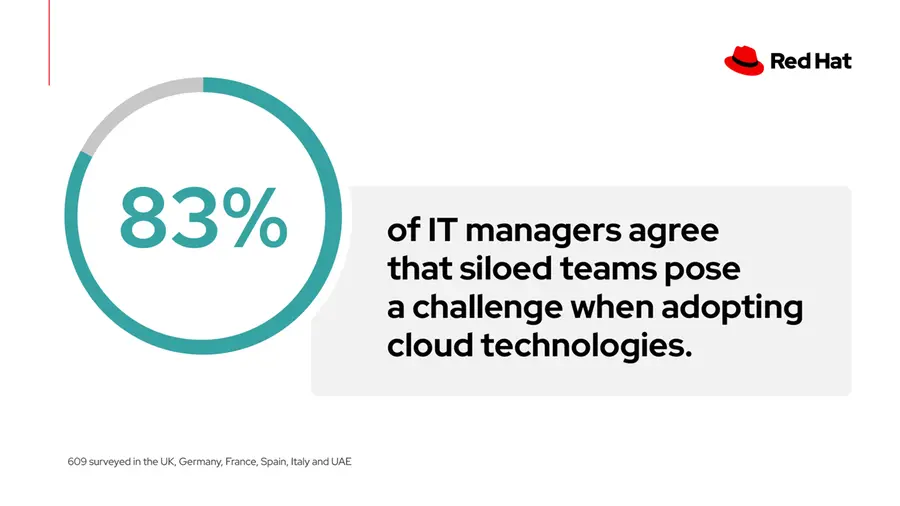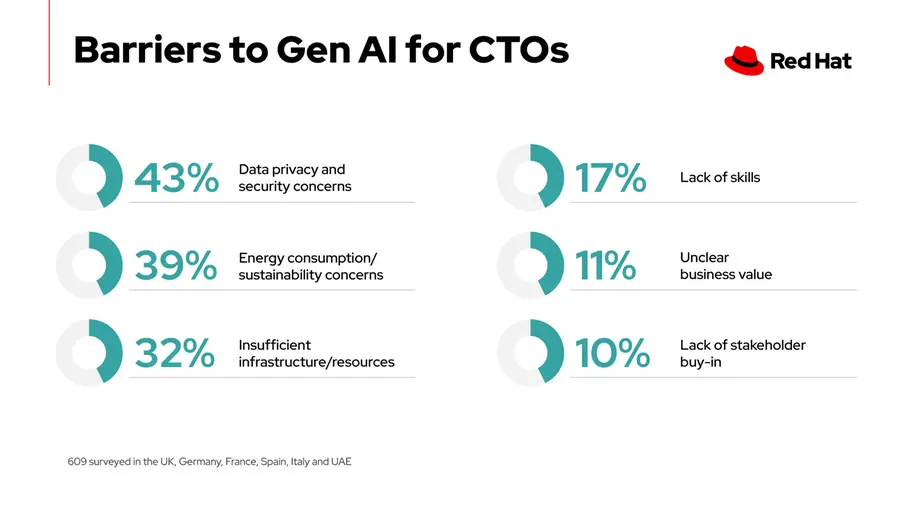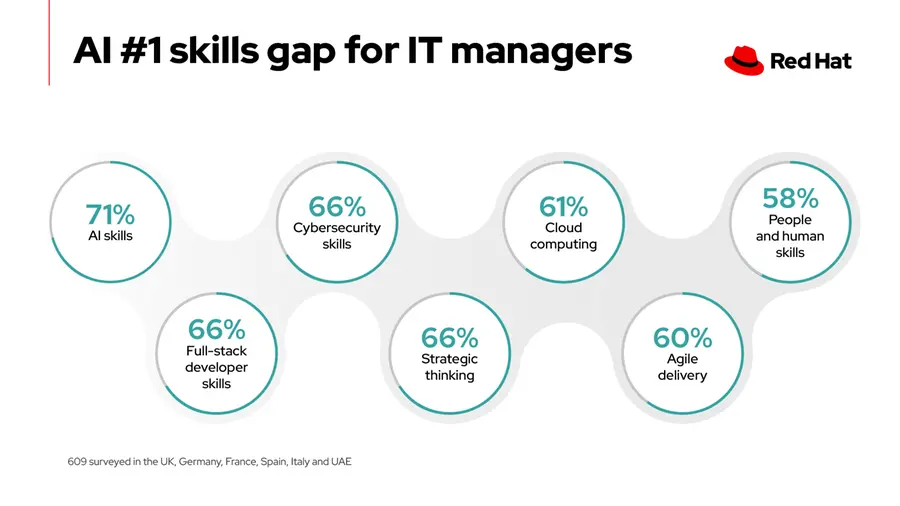PHOTO
DUBAI, UAE – Red Hat, Inc., the world's leading provider of open source solutions, today announced new survey results highlighting key drivers for cloud strategies over the next 18 months, which showed that 66% of UAE-based businesses surveyed plan to prioritise centralising cloud management.
In addition to other key findings, 44% of surveyed organisations across the UAE stated they would prioritise moving to hybrid/multi-cloud and reducing their dependency on a single provider over the next 18 months, while 45% of organisations said they will emphasise security, compliance, and sovereignty regulatory requirements.
The research surveyed 609 IT managers from large businesses (500+ employees) across six countries: France, Germany, Italy, Spain, the UAE and the UK. It explores the priorities and challenges for IT managers as they navigate cloud complexity and the opportunities and barriers, they face in executing AI strategies.
According to the report, 79% of UAE-based respondents consider cloud technology investment a priority for 2025. 16% are planning a strong focus on innovation and new technologies, while 31% expect balanced growth between new technologies and enhancements to existing systems. Of this subset of respondents, 72% plan to increase their investment in cloud technologies by 21%-50%, while 15% will increase their investment by 51%-75%.
100% of UAE IT managers see advantages in adopting enterprise open source solutions for AI, including predictive and generative. Accelerating innovation is seen as the top benefit of enterprise open source AI in the UAE (41%), with improved ecosystem collaboration and integration coming in second place (50%).
Cloud is an investment priority
IT managers surveyed across the six countries describe their organisation’s planned approach to investing in cloud technology by 2025:
- ● Half (50%) are taking a balanced approach, focusing equally on new technologies and enhancements to existing systems
- ● 26% have a strong focus on innovation and new technologies
- ● 14% are focused on essential services only
Across the six countries, respondents were also asked about priority areas for their organisation's cloud strategy for the next 18 months.


The following came top:
- ● Centralising cloud management (80%)
- ● Security, compliance and sovereignty regulatory requirements (78%)
- ● Preparing for AI adoption (77%)
- ● Evolving cloud strategy in line with business objectives (76%)
Siloed teams are slowing cloud adoption
96% of IT managers surveyed said siloed teams pose challenges when adopting cloud technologies, with 53% encountering this issue frequently.


Among those affected, the most common impacts on cloud strategy are:
- ● Inconsistent security and compliance across different providers (cited by 54%)
- ● Increased costs (47%)
- ● Limited control and visibility over cloud resources (42%)
Readiness for AI
When asked about their ability to take advantage of the growing AI opportunity, 40% of IT managers surveyed state that their organisation has scalable, flexible and accessible IT platforms but lack the right skill sets to fully harness AI’s potential. This compares to 25% that have the right platforms and feel well-positioned to get the best value from them, and 35% who are in need of new platforms (22% of which are on a path to acquire these).
With generative AI increasingly being explored by enterprises looking to solve existing problems or seize new opportunities, the survey looked into the importance of a range of factors in determining trust in an enterprise model for generative AI. It found that the following all placed similarly among respondents:
- ● Transparent, modifiable models with explainable sources (cited by 89%)
- ● Proven performance and reliability in similar use cases (85%)
- ● Protection with model indemnification (84%)
- ● Compliance with data privacy and security standards (83%)
- ● Accessible for use across teams, not just data scientists (83%)
- ● Cost-effectiveness (82%)
- ● Domain-specific models (as opposed to generic LLMs) (79%)


The survey asked for the main obstacles preventing CTOs or equivalent decision makers from advancing generative AI initiatives. The top listed were:
- ● Concerns about data privacy and security (43%)
- ● Energy consumption / sustainability concerns (39%)
- ● Insufficient infrastructure or resources (32%)
- ● Lack of transparency in AI models (31%)
Supporting Quotes
Hans Roth, Senior Vice President & General Manager EMEA, Red Hat, stated “Cloud technology continues to unlock significant advantages in scalability, cost efficiency and faster time to market. Yet, this adoption can also drive increased complexity, with many organisations finding themselves slowed down by internal silos, as shown in this latest survey. With the increasing prominence of AI in cloud strategies, we see from this survey that both IT managers and CTOs care about transparency when it comes to AI models: we believe that an open source approach can bring the transparency, modifiability and explainability needed for enterprise-ready generative AI.”
Adrian Pickering, Regional General Manager commented on the findings, “Businesses in the UAE are strongly motivated to use cloud technologies to stay competitive, manage cost pressures, and boost overall efficiency. As we look to the future, we see AI playing a central role in innovation and necessitating greater flexibility, choice, and independence across different cloud environments. This requires strategic collaboration, allowing organisations to seamlessly integrate diverse tools, vendors, and clouds. Businesses can confidently navigate the rapid advancements in AI by adopting an open-source approach, bolstered by Red Hat's robust enterprise support and a vast network of contributors.”
Connect with Red Hat
- ● Learn more about Red Hat
- ● Get more news in the Red Hat newsroom
- ● Read the Red Hat blog
- ● Follow Red Hat on Twitter
- ● Follow Red Hat on Instagram
- ● Watch Red Hat videos on YouTube
- ● Follow Red Hat on LinkedIn
Methodology
The research referenced in this press release was conducted by international market research consultancy Censuswide, among a sample of 609 IT Managers aged 18+ in Large Businesses (500+ Employees). The survey ran across the UK, French, German, Italian, Spanish and UAE markets, with at least 100 respondents from each market. The data was collected between 15th-23rd of August 2024. Censuswide abides by and employs members of the Market Research Society and follows the MRS code of conduct which is based on the ESOMAR principles.
Definitions used in the survey:
Cloud management: the control and orchestration of products and services that operate in a cloud environment (public cloud, private cloud, hybrid and multicloud), including processes, strategies, policies and technology
Cloud strategy: the use of cloud infrastructure to run applications, including private cloud, public cloud, and the use of cloud-native technology such as containers to develop software.
IT platform: An operating system, infrastructure or application platform for developing and scaling applications, including AI apps, consistently across datacentre, cloud and multiple public clouds
Enterprise open source software: open source software that is supported by a vendor, usually via a subscription fee. For example, the vendor stabilises and quality-assures the software, certifies it works with an ecosystem of hardware and software, secures it and provides technical support.
About Red Hat, Inc.
Red Hat is the world’s leading provider of enterprise open source software solutions, using a community-powered approach to deliver reliable and high-performing Linux, hybrid cloud, container, and Kubernetes technologies. Red Hat helps customers integrate new and existing IT applications, develop cloud-native applications, standardize on our industry-leading operating system, and automate, secure, and manage complex environments. Award-winning support, training, and consulting services make Red Hat a trusted adviser to the Fortune 500. As a strategic partner to cloud providers, system integrators, application vendors, customers, and open source communities, Red Hat can help organizations prepare for the digital future.
Forward-Looking Statements
Except for the historical information and discussions contained herein, statements contained in this press release may constitute forward-looking statements within the meaning of the Private Securities Litigation Reform Act of 1995. Forward-looking statements are based on the company’s current assumptions regarding future business and financial performance. These statements involve a number of risks, uncertainties and other factors that could cause actual results to differ materially. Any forward-looking statement in this press release speaks only as of the date on which it is made. Except as required by law, the company assumes no obligation to update or revise any forward-looking statements.
###
Red Hat, Red Hat Enterprise Linux, the Red Hat logo and OpenShift are trademarks or registered trademarks of Red Hat, Inc. or its subsidiaries in the U.S. and other countries. Linux® is the registered trademark of Linus Torvalds in the U.S. and other countries.
For further information, please contact:
Orient Planet Group (OPG)
Email: media@orientplanet.com
Website: www.orientplanet.com




















